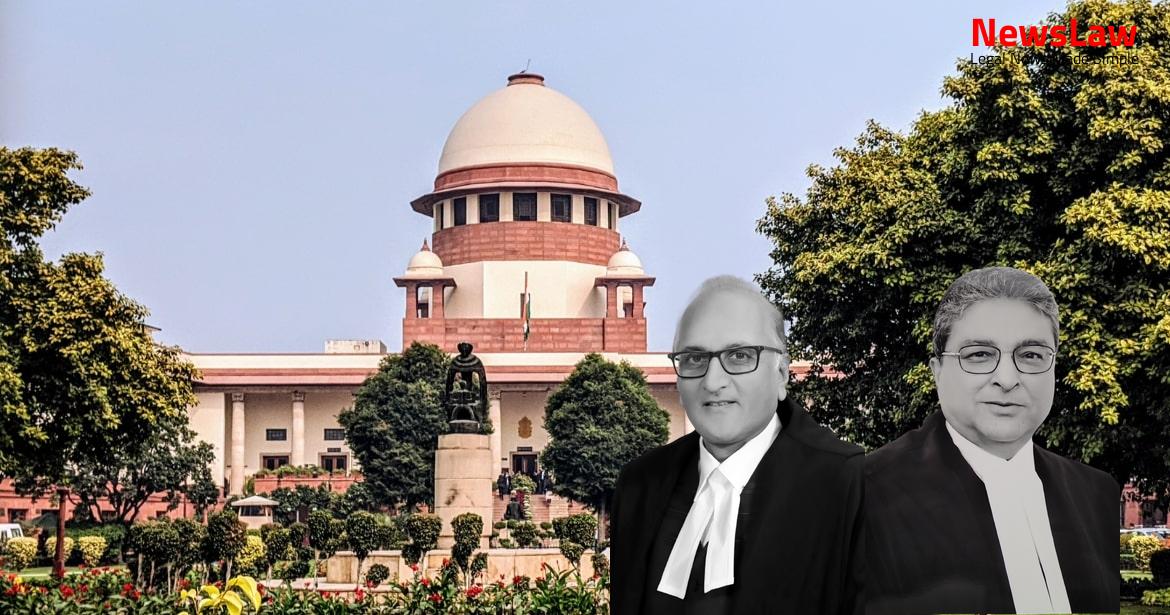Explore a fascinating legal case where the court, despite upholding the conviction, decided to reduce the sentence for a non-compoundable offence. The court’s in-depth legal analysis of the circumstances and the parties’ voluntary settlement led to a nuanced decision that sheds light on the complexities of criminal law. Read on to delve into the intricacies of this intriguing case.
Facts
- The record of the case shows that the findings of both Courts are concurrent and without fault.
- The complainant brought the injured to the hospital for treatment and was subsequently impleaded as a party to the present appeal.
- Leave has been granted for the appeal.
- The appellant is dissatisfied with the High Court’s judgment upholding his conviction under Section 307 of the Indian Penal Code.
- The High Court directed the appellant to serve rigorous imprisonment for 10 years, pay a fine of Rs. 10,000/-, and face three months’ rigorous imprisonment in default.
- The case of the prosecution revolves around an incident where the appellant, along with two associates, stabbed the complainant’s maternal uncle with a sharp-edged weapon during a Sandal procession.
- The charge-sheet was filed under Section 307 read with Section 34 of the IPC based on the investigation and the complainant’s report.
- PW 7 Chintaman Dange and PW 11 Doctor Adhe provided unimpeachable testimony
- Appellant was convicted under Section 307 IPC for 10 years and fined Rs. 10,000
- Accused appealed to Nagpur High Court, but the appeal was dismissed
- PW 7 Chintaman Dange was later impleaded as a party respondent
Also Read: Recovery of Misappropriated Temple Funds: Court’s Legal Analysis
Analysis
- In this case, the victim has voluntarily accepted the apology of the appellant, considering his age at the time of the incident.
- The injured victim has forgiven the appellant and has come forward to settle the dispute without reservation.
- The counsel for the injured victim reiterated the victim’s forgiveness during arguments.
- The court referred to a similar case, Murali Vs. State, where a compromise led to interference in the quantum of sentence despite the offence being non-compoundable.
- The court cited previous judgments where reduction of sentence was allowed in serious non-compoundable offences based on compromise.
- The court found the present case to be a fit one for reconsidering the quantum of sentence due to subsequent events and the voluntary settlement between the parties.
- The parties involved have mutually settled their disputes and apologized, with no coercion or inducement involved.
- The joint affidavit filed by the parties indicates an amicable settlement based on the advice of elders.
- The appellant has apologized for his actions, taken responsibility, and maturely sought forgiveness from the victim.
- The joint affidavit of the appellant and the victim residing in the same village peacefully after the incident indicates a fit case for reduction of sentence.
- The voluntary acceptance of the apology by the victim, without coercion or inducement, after some time has passed, instills confidence.
Also Read: Determining Seniority in Delayed Appointments: Legal Analysis
Decision
- Pending application(s) stand disposed of.
- Considering the overall facts on record, mitigating factors, and circumstances of the crime.
- Conviction under Section 307 IPC upheld.
- Quantum of sentence reduced to five years rigorous imprisonment.
- Appellant also fined Rs. 10,000/- with three months’ further imprisonment in default.
- Appeal partly allowed.
Also Read: Legal Analysis in Assault and Homicide Case
Case Title: SY. AZHAR SY. KALANDAR Vs. THE STATE OF MAHARASHTRA (2021 INSC 471)
Case Number: Crl.A. No.-000988-000988 / 2021



